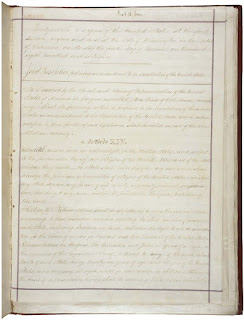“Don’t know the manners of good society, eh? Well, I guess I know enough to turn you inside out, old gal – you sockdologizing old man-trap!”
– A comedic line from the play “Our American Cousin” (1858) – spoken by an actor at Ford’s Theater in 1865, the moment before Lincoln was shot there by John Wilkes Booth
Background on John Wilkes Booth, and his unrealized plot to kidnap Abraham Lincoln
I have seen many films about the Civil War. But this film may still rank among the best, despite its relative brevity. It is only 90 minutes long, and it is brilliantly narrated by the actor Chris Cooper. It has many omissions, but it also has some great storytelling. (More about the omissions later.) After a brief introduction, they start by delving into the early life of John Wilkes Booth. They spend some time on his successful stage career, and his early sympathy with the Confederacy. Ironically, John Wilkes Booth had a pro-Northern brother, who later disowned the actions of his notorious sibling. The brother-against-brother phenomenon extended right into the Booths’ own family. But I’m getting ahead of myself here. They spend time on his growing dissatisfaction with Abraham Lincoln, which would later turn into murderous rage. Booth felt some guilt about not having fought for the Confederacy on the battlefield. Thus, he recruited people to help him in a plot to kidnap Abraham Lincoln, and bring him southward. Obviously, this kidnapping plot was never realized – partly because his accomplices pointed out that there were some slight flaws in his plan. But, eight hours before the fateful gunshots, he learned that President Lincoln would be attending Ford’s Theater that night. Thus, he worked at a feverish pace to lay the groundwork for the later events of that evening. Lincoln had few bodyguards around him, in part because no president had ever been assassinated before. That is, there were many other times where Booth could have killed Lincoln with relatively few risks to himself. But he chose Ford’s Theater instead, in part because of his familiarity with the stage. Thus, he got ready to kill President Lincoln. But he also had some accomplices remaining, as well as two other targets.
John Wilkes Booth, the man who murdered Abraham Lincoln
Booth with brothers Edwin and Junius Jr. in Julius Caesar












